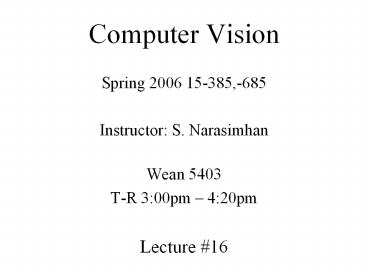Computer%20Vision PowerPoint PPT Presentation
Title: Computer%20Vision
1
Computer Vision
- Spring 2006 15-385,-685
- Instructor S. Narasimhan
- Wean 5403
- T-R 300pm 420pm
- Lecture 16
2
Announcements
- Homework 4 due today.
- Homework 5 will be out tonight, due in two
weeks. - Use bboard frequently and visit us during OH.
3
- Optical Flow and Motion
- Lecture 16
4
Optical Flow and Motion
- We are interested in finding the movement of
- scene objects from time-varying images (videos).
- Lots of uses
- Track object behavior
- Correct for camera jitter (stabilization)
- Align images (mosaics)
- 3D shape reconstruction
- Special effects
5
Tracking Rigid Objects
(Simon Baker, CMU)
6
Tracking Non-rigid Objects
(Comaniciu et al, Siemens)
7
Face Tracking
(Simon Baker et al, CMU)
8
Applications of Face Tracking
- User Interfaces
- Mouse Replacement Head Pose and Gaze Estimation
- Automotive Windshield Displays, Smart Airbags,
Driver Monitoring - Face Recognition
- Pose Normalization
- Model-Based Face Recognition
- Lipreading/Audio-Visual Speech Recognition
- Expression Recognition and Deception Detection
- Rendering and Animation
- Expression Animations and Transfer
- Low-Bandwidth Video Conferencing
- Audio-Visual Speech Synthesis
(Simon Baker, CMU)
9
3D Structure from Motion
(David Nister, Kentucky)
10
3D Structure from Motion
(David Nister, Kentucky)
11
Behavior Analysis
Query
Result
(Michal Irani, Weizmann)
12
Motion Field
- Image velocity of a point moving in the scene
13
Optical Flow
- Motion of brightness pattern in the image
- Ideally Optical flow Motion field
14
Optical Flow Motion Field
Motion field exists but no optical flow
No motion field but shading changes
15
Problem Definition Optical Flow
- How to estimate pixel motion from image H to
image I?
- Find pixel correspondences
- Given a pixel in H, look for nearby pixels of the
same color in I
- Key assumptions
- color constancy a point in H looks the same
in image I - For grayscale images, this is brightness
constancy - small motion points do not move very far
16
Optical Flow Constraint Equation
Optical Flow Velocities
Displacement
- Assume brightness of patch remains same in both
images
- Assume small motion (Taylor expansion of LHS
upto first order)
17
Optical Flow Constraint Equation
Divide by and take the limit
Constraint Equation
NOTE must lie on a straight line We
can compute using gradient
operators! But, (u,v) cannot be found uniquely
with this constraint!
18
Finding Gradients in X-Y-T
y
time
j1
k1
j
k
x
i
i1
19
Optical Flow Constraint
- Intuitively, what does this constraint mean?
- The component of the flow in the gradient
direction is determined - The component of the flow parallel to an edge is
unknown
20
Optical Flow Constraint
21
Aperture Problem
22
Aperture Problem
23
Computing Optical Flow
- Formulate Error in Optical Flow Constraint
- We need additional constraints!
- Smoothness Constraint (as in shape from shading
and stereo) - Usually motion field varies smoothly in the
image. - So, penalize departure from smoothness
- Find (u,v) at each image point that MINIMIZES
weighting factor
24
Discrete Optical Flow Algorithm
- Consider image pixel
- Departure from Smoothness Constraint
- Error in Optical Flow constraint equation
- We seek the set that
minimize
NOTE show up in more than one term
25
Discrete Optical Flow Algorithm
- Differentiating w.r.t
and setting to zero - are averages of
around pixel
Update Rule
26
Example
27
Optical Flow Result
28
Low Texture Region - Bad
- gradients have small magnitude
29
Edges so,so (aperture problem)
- large gradients, all the same
30
High Textured Region - Good
- gradients are different, large magnitudes
31
Focus of Expansion (FOE)
- Motion of object - (Motion of Sensor)
- For a given translatory motion and gaze
direction, the world - seems to flow out of one point (FOE).
After time t, the scene point moves to
32
Focus of Expansion (FOE)
- As t varies the image point moves along a
straight line in the image - Focus of Expansion Lets backtrack time or
33
Focus of Expansion (FOE) - Example
http//homepages.inf.ed.ac.uk/rbf/BOOKS/BANDB/LIB/
bandb7_12.pdf
34
Revisiting the Small Motion Assumption
- Is this motion small enough?
- Probably notits much larger than one pixel (2nd
order terms dominate) - How might we solve this problem?
35
Reduce the Resolution!
36
Coarse-to-fine Optical Flow Estimation
37
Coarse-to-fine Optical Flow Estimation
run iterative OF
38
Image Alignment
- Goal Estimate single (u,v) translation
(transformation) for entire image
39
Mosaicing
(Michal Irani, Weizmann)
40
Mosaicing
(Michal Irani, Weizmann)
41
Next Class
- Structured Light and Range Imaging
- Reading ? Notes

